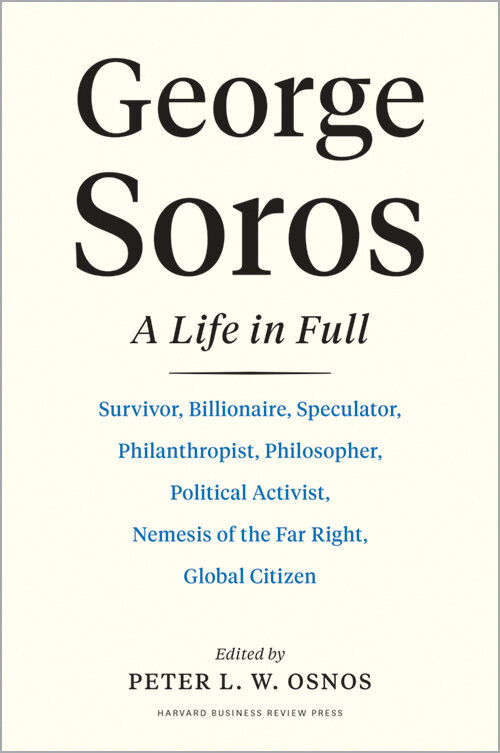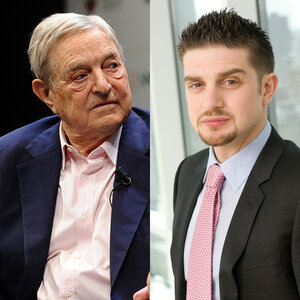George Soros: A Life in Full
It feels like our idea of an “open society” is in retreat. Wherever we look—be it the United States, where anti-democratic forces are rolling back voting rights; or Russia, where opposition leaders are imprisoned and restrictive press freedoms make it nearly impossible to report the news; or Ukraine, where the very existence of a free and democratic country is being challenged with military force—our notions of justice, rights, and political freedom are under threat. What we are learning in these precipitous times is that the truths we hold to be self-evident are in fact won—and lost—by our own willingness to nurture and defend them. And that is something George Soros understands very well.
The day before the publication of George Soros: A Life in Full, edited by longtime Soros publisher Peter L.W. Osnos, the Open Society Foundations (OSF) announced a $25 million pledge to launch the $100 million Ukraine Democracy Fund in response to Russia’s unprovoked invasion of its neighbor. This timing could not have been more appropriate, reflecting the urgency of the moment to support Ukrainian civil society and bolster relief efforts, while opening a window on the life and work of one of the last half-century’s more remarkable philanthropists. Soros, at the age of 91, is where he has always been: outspoken on his values and out front in his support of a world that embraces universal justice, human rights, political freedom, education, public health, and a free press.
Soros’s life story has been told in two major biographies: Robert Slater’s Soros: The World's Most Influential Investor, first published in 1996 and revised in 2009, and Michael T. Kaufman’s 2002 George Soros: The Life and Times of a Messianic Billionaire. From these sources we learn of Soros’s hiding his Jewish identity in Nazi-occupied Hungary; his early lessons in arbitrage, buying and selling currency in the cafes of post-war Budapest; his escape to London as a refugee following the Communist takeover; his job as a railway porter to pay his way through the London School of Economics (LSE); his move to New York; and his meteoric rise in international finance.
It was at LSE that Soros first learned from the philosopher Karl Popper the concept of the “open society,” where individuals, and by extension their communities, are actively engaged in framing the structure of society, not simply accepting a dictated and proscribed version of it. For Soros, an intellectual embrace of humanitarianism, equality, and political freedom fit easily alongside his personal abhorrence to authoritarianism. By 1979—not yet a billionaire, but deciding he had enough money—he began funding scholarships for Black South Africans to study abroad and supporting intellectuals from Eastern Europe to travel and engage with their peers in the West. Since then, Soros has described his staggering wealth as liberation, not from who he is, but rather a freedom to fulfill a perceived obligation—born of his heritage, or simply his lived experience—to fix what is wrong in the world; what Jewish tradition describes as tikkun olam. Soros and OSF have gone on to fund countless projects internationally, including the International Renaissance Foundation in Ukraine since 1990, and the Central European University (CEU), which has graduated nearly 18,000 students since 1991. Four decades on, Soros has invested an estimated $38 billion in creating his vision of an open society.
Soros has described his staggering wealth as liberation, not from who he is, but rather a freedom to fulfill a perceived obligation—born of his heritage, or simply his lived experience–to fix what is wrong in the world....
Since the publication of Slater’s and Kaufman’s biographies, we haven’t seen any serious scholarship on Soros or his worldview. What we have seen is more than a decade of vituperative attacks without any substantive defense of Soros or his philanthropy. He has long been the focus of antipathy from authoritarians abroad and the conspiratorially minded fringes of American politics. As a wealthy, Jewish, immigrant, philanthropist with a decidedly internationalist worldview, Soros has endured the not-so-veiled anti-Semitic attacks tarring him as a puppet master and globalist—attacks that in the West are more often laughed away than taken seriously. In Hungary, however, where CEU, Soros’s signature accomplishment in his place of birth, decided to shutter its campus in 2018 under attack from the country’s president, Viktor Orbán, and the passage of what were commonly known as the “Stop Soros” laws. That year his life was threatened when a pipe bomb was found in his mailbox. Most recently Soros was the subject of an incendiary right-wing polemic-cum-biography.
A Life in Full is a series of eight biographic essays that doesn’t pretend to be comprehensive. But in its eclectic authorship (authors, editors, historians, public intellectuals, and philanthropic leaders) what emerges is perspective, both in terms of the man and his mission. From Bard College president Leon Botstein, himself a post-war Jewish émigré to America, we come to see Soros’s deeply personal reflection that he would always be seen as Jewish, as other, and that to combat that otherness it was necessary to make an “overarching commitment to universalism” where being Jewish was just one of a multitude of identities. From Sebastien Mallaby, a journalist and senior fellow at the Council on Foreign Relations, we learn about Soros’ acumen for finance, and how his recognition of the inherent instability of systems and his feel for risk—his preternatural ability to know when to buy and sell and to cut his losses—be it in global finance or civil society, was helped by his search for a larger philosophical arc to understand the world. From editor and academic Eva Hoffman—also a Jewish émigré—we see Soros through the life of his father, a Russian prisoner of war in the First World War, a devoted Esperantist who saw the cosmopolitan openness of Hungary and its relative welcome of Jews vanish in the in the inter-war years and never fully assimilated to life in the United States after fleeing Hungary in the 1950s.
Anchoring this volume is an essay by Ford Foundation president Darren Walker that deftly makes the connection between Soros’s philosophy, financial acumen, and philanthropy. While Walker makes passing note of Soros’s initial philanthropy as more tax avoidance than actual game plan, it is abundantly clear that his ideas about an open society had always been a motive force in his giving. As his fortune piled up, so too did his ambition for philanthropy. And like the philanthropists of the early 20th century who looked to solve the world’s problems through scientific philanthropy, now Soros was going to apply his own philosophy to a world in need of fixing.
But unlike Andrew Carnegie or John D. Rockefeller then, or Bill Gates today, or even the tech-enamored, business model-obsessed philanthropic investors, “Soros’s focus on [an] open society is broader than scientific or developmental progress.” What Soros is after, Walker concludes, is “a world and a nation where the open society principles, human rights, and equity are the objectives.” In this way, wealth and abundance are not the source of happiness but the byproduct of a healthy—and open—society. And if Soros started out as a successful arbitrage trader by day and a failed philosopher by night, he ended up inspiring a generation of new philanthropists, among them Mackenzie Scott who is forging her own equity-focused path to creating a just and open society.
...wealth and abundance are not the source of happiness but the byproduct of a healthy—and open—society. And if Soros started out as a successful arbitrage trader by day and a failed philosopher by night, he ended up inspiring a generation of new philanthropists....
So, A Life in Full arrives at a precipitous moment, and it would be difficult to expect that a single work could carry all the scholarly, political, and cultural water we might want. Much as we have perhaps taken for granted Soros’s willingness to double down on his long bets at funding and encouraging an open society, so too we now seem to need Peter Osnos, his longtime publisher and collaborator—with what is described as unspecified “Soros-related funding”—to deepen our understanding of the philanthropist and further illuminate his work and life. It is no surprise that this volume is more than a little flattering of its subject, but in a very real sense, that, too, is on us. These are serious authors, and while their fondness for their subject is abundantly clear, it is perhaps that affection, and in some cases a shared history, that gives this collective portrait of Soros the breadth, perspective, and understanding we need.
This is also a watershed moment for OSF. In September 2021 the organization announced plans for a streamlining of its 47 grantmaking entities, and the ending of many longstanding funding relationships, admittedly made less painful by $400 million commitment to ease grantees in 120 countries into the sunset. While many of the old relationships are expected to be revived in the new framework, what comes next remains to be seen. When announcing the Ukraine Democracy Fund, Soros’s son and OSF deputy chair Alex Soros concluded: “We have one simple message: we will never abandon Ukraine.” So while there is still work to be done, George Soros, and his vision of an open society, will be with us for some time to come.
Daniel X Matz is contributing editor at Philanthropy News Digest.









